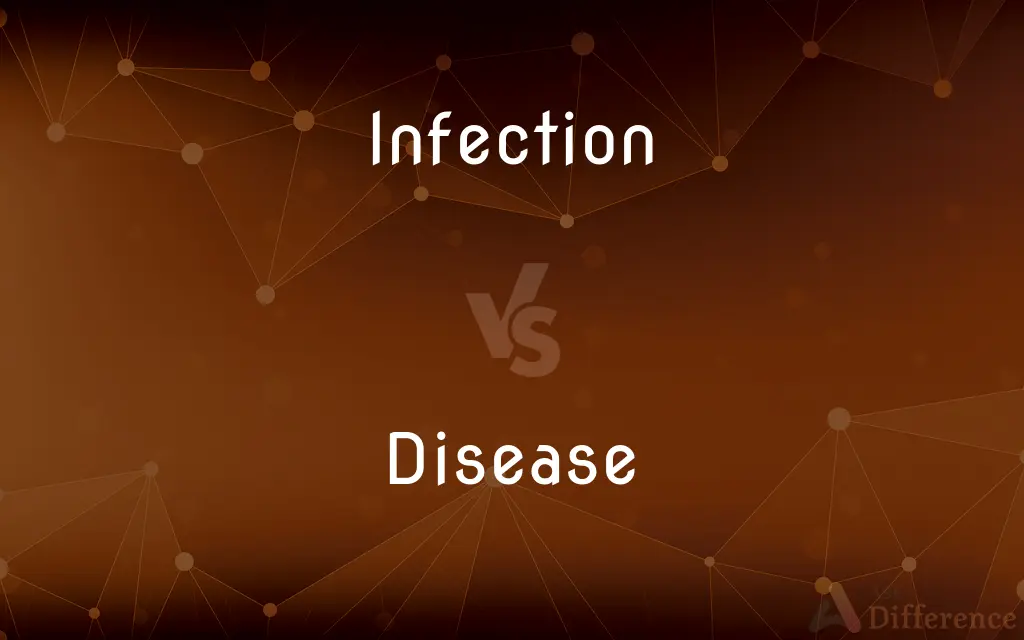Infection vs. Disease — What's the Difference?
By Tayyaba Rehman — Updated on September 21, 2023
An infection occurs when harmful pathogens enter the body, while a disease is a specific abnormal condition affecting the body or mind. Infections can lead to diseases, but not all diseases result from infections.

Difference Between Infection and Disease
Table of Contents
ADVERTISEMENT
Key Differences
An infection is an invasion and multiplication of microorganisms such as bacteria, viruses, and fungi in the body. These microorganisms might not always cause harm. Disease, on the other hand, refers to a particular abnormal condition that disrupts the body's usual functioning, which can be caused by factors beyond infections.
Infections are primarily caused by external agents, including pathogens, that enter and replicate within the host's body. Conversely, diseases can manifest due to genetic predispositions, environmental factors, lifestyle choices, or a combination of these, beyond just the presence of infectious agents.
It's crucial to understand that while all infections have the potential to lead to diseases, not all of them do. Some infections are asymptomatic, meaning they don't produce noticeable symptoms. In contrast, a disease, when identified, always presents a set of symptoms or conditions that affect overall health.
In some cases, the body can fend off infections without them leading to diseases. Our immune system plays a vital role in battling infections and preventing them from progressing into diseases. Conversely, some diseases, like many chronic conditions, arise without an underlying infection.
Medical interventions differ when addressing infections versus diseases. Infections might be treated with antimicrobials, such as antibiotics for bacterial infections. In contrast, managing a disease often requires a more holistic approach, including lifestyle changes, medications, or even surgery, depending on the disease in question.
ADVERTISEMENT
Comparison Chart
Cause
Invasion of pathogens
Abnormal condition in body or mind
Origins
External agents (e.g., bacteria, viruses)
Multiple factors (including infections)
Symptomatic Presence
Can be asymptomatic or symptomatic
Always presents symptoms or conditions
Scope
Specific to pathogen invasion
Broad, can be caused by genetics, environment, etc.
Treatment Focus
Often targets the causing pathogen
Addresses symptoms and root causes
Compare with Definitions
Infection
The presence and growth of pathogens within the host body.
Proper hygiene can reduce the risk of bacterial infection.
Disease
An abnormal condition affecting the body or mind.
Diabetes is a disease that impacts how your body uses sugar.
Infection
A condition where foreign agents multiply in the body.
The flu is a viral infection affecting the respiratory system.
Disease
A specific health condition with recognizable symptoms.
Alzheimer's disease affects cognitive functions over time.
Infection
The process by which tissues are invaded by disease-causing agents.
Without vaccinations, many are susceptible to serious infections.
Disease
A pathological condition of a part, organ, or system.
Crohn's disease affects the digestive system.
Infection
Invasion of the body by harmful microorganisms.
A wound can become a gateway for infection if not cleaned properly.
Disease
A disorder with specific causes and symptoms.
Early detection can improve outcomes for many diseases.
Infection
An infection is the invasion of an organism's body tissues by disease-causing agents, their multiplication, and the reaction of host tissues to the infectious agents and the toxins they produce. An infectious disease, also known as a transmissible disease or communicable disease, is an illness resulting from an infection.
Disease
A disease is a particular abnormal condition that negatively affects the structure or function of all or part of an organism, and that is not due to any immediate external injury. Diseases are often known to be medical conditions that are associated with specific signs and symptoms.
Infection
The invasion of bodily tissue by pathogenic microorganisms that proliferate, resulting in tissue injury that can progress to disease
Measures taken by the hospital to prevent infection.
Disease
A disorder of structure or function in a human, animal, or plant, especially one that produces specific symptoms or that affects a specific location and is not simply a direct result of physical injury
Heart disease
Bacterial meningitis is quite a rare disease
Infection
The entry or placement, as by injection, of a microorganism or infectious agent into a cell or tissue.
Disease
An abnormal condition of a part, organ, or system of an organism resulting from various causes, such as infection, inflammation, environmental factors, or genetic defect, and characterized by an identifiable group of signs, symptoms, or both.
Infection
An instance of being infected
Developed an infection in my toe.
Disease
A condition or tendency, as of society, regarded as abnormal and harmful.
Infection
An agent or a contaminated substance responsible for one's becoming infected
An infection spread by contaminated water.
Disease
(Obsolete) Lack of ease; trouble.
Infection
The pathological state resulting from having been infected
A drug to control infection.
Disease
(medicine) An abnormal condition of a human, animal or plant that causes discomfort or dysfunction; distinct from injury insofar as the latter is usually instantaneously acquired.
The tomato plants had some kind of disease that left their leaves splotchy and fruit withered.
Infection
An infectious disease
Crowded conditions gave rise to several serious infections.
Disease
(by extension) Any abnormal or harmful condition, as of society, people's attitudes, way of living etc.
Infection
An instance of a virus or similar software program infecting a computer.
Disease
Lack of ease; uneasiness; trouble; vexation; disquiet.
Infection
The communication of a usually undesirable idea, emotion, or attitude by contact with other people or by example.
Disease
(obsolete) To cause unease; to annoy, irritate.
Infection
(pathology) The act or process of infecting.
Disease
To infect with a disease.
Infection
An uncontrolled growth of harmful microorganisms in a host.
Disease
Lack of ease; uneasiness; trouble; vexation; disquiet.
So all that night they passed in great disease.
To shield thee from diseases of the world.
Infection
A disease caused by a pathogen.
Disease
An alteration in the state of the body or of some of its organs, interrupting or disturbing the performance of the vital functions, and causing or threatening pain and weakness; malady; affection; illness; sickness; disorder; - applied figuratively to the mind, to the moral character and habits, to institutions, the state, etc.
Diseases desperate grown,By desperate appliances are relieved.
The instability, injustice, and confusion introduced into the public counsels have, in truth, been the mortal diseases under which popular governments have every where perished.
Infection
A visible sign of such a disease, such as the suppuration of a wound.
Disease
To deprive of ease; to disquiet; to trouble; to distress.
His double burden did him sore disease.
Infection
The act or process of infecting.
There was a strict order against coming to those pits, and that was only to prevent infection.
Disease
To derange the vital functions of; to afflict with disease or sickness; to disorder; - used almost exclusively in the participle diseased.
He was diseased in body and mind.
Infection
That which infects, or causes the communicated disease; any effluvium, miasm, or pestilential matter by which an infectious disease is caused.
And that which was still worse, they that did thus break out spread the infection further by their wandering about with the distemper upon them.
Disease
An impairment of health or a condition of abnormal functioning
Infection
The state of being infected; the condition of suffering from an infectious disease; contamination by morbific particles; the result of infecting influence; a prevailing disease; epidemic.
The danger was really very great, the infection being so very violent in London.
Disease
Any deviation from a healthy state.
Heart disease remains a leading cause of death worldwide.
Infection
That which taints or corrupts morally; as, the infection of vicious principles.
It was her chance to lightAmidst the gross infections of those times.
Infection
Contamination by illegality, as in cases of contraband goods; implication.
Infection
Sympathetic communication of like qualities or emotions; influence.
Through all her train the soft infection ran.
Mankind are gay or serious by infection.
Infection
A localized area of tissue which is inflamed by growth of microorganisms; as, he has an infection in his finger.
Infection
The pathological state resulting from the invasion of the body by pathogenic microorganisms
Infection
(phonetics) the alteration of a speech sound under the influence of a neighboring sound
Infection
(medicine) the invasion of the body by pathogenic microorganisms and their multiplication which can lead to tissue damage and disease
Infection
An incident in which an infectious disease is transmitted
Infection
The communication of an attitude or emotional state among a number of people;
A contagion of mirth
The infection of his enthusiasm for poetry
Infection
Moral corruption or contamination;
Ambitious men are led astray by an infection that is almost unavoidable
Infection
(international law) illegality that taints or contaminates a ship or cargo rendering it liable to seizure
Infection
An instance of harmful organisms colonizing the body.
Strep throat is a common bacterial infection in children.
Common Curiosities
What causes an infection?
Infections are caused by pathogens such as bacteria, viruses, fungi, or parasites.
Can infections be prevented?
Many infections can be prevented through hygiene, vaccinations, and avoiding contagion.
How are infections diagnosed?
Infections are diagnosed based on symptoms, physical examination, and laboratory tests.
Can diseases be inherited?
Yes, some diseases are genetic and can be passed down through families.
Are all diseases caused by infections?
No, diseases can arise from various factors, including genetics, environmental exposures, and lifestyle choices.
Share Your Discovery

Previous Comparison
Garrot vs. Garrote
Next Comparison
Girlfriend vs. FriendAuthor Spotlight
Written by
Tayyaba RehmanTayyaba Rehman is a distinguished writer, currently serving as a primary contributor to askdifference.com. As a researcher in semantics and etymology, Tayyaba's passion for the complexity of languages and their distinctions has found a perfect home on the platform. Tayyaba delves into the intricacies of language, distinguishing between commonly confused words and phrases, thereby providing clarity for readers worldwide.














































